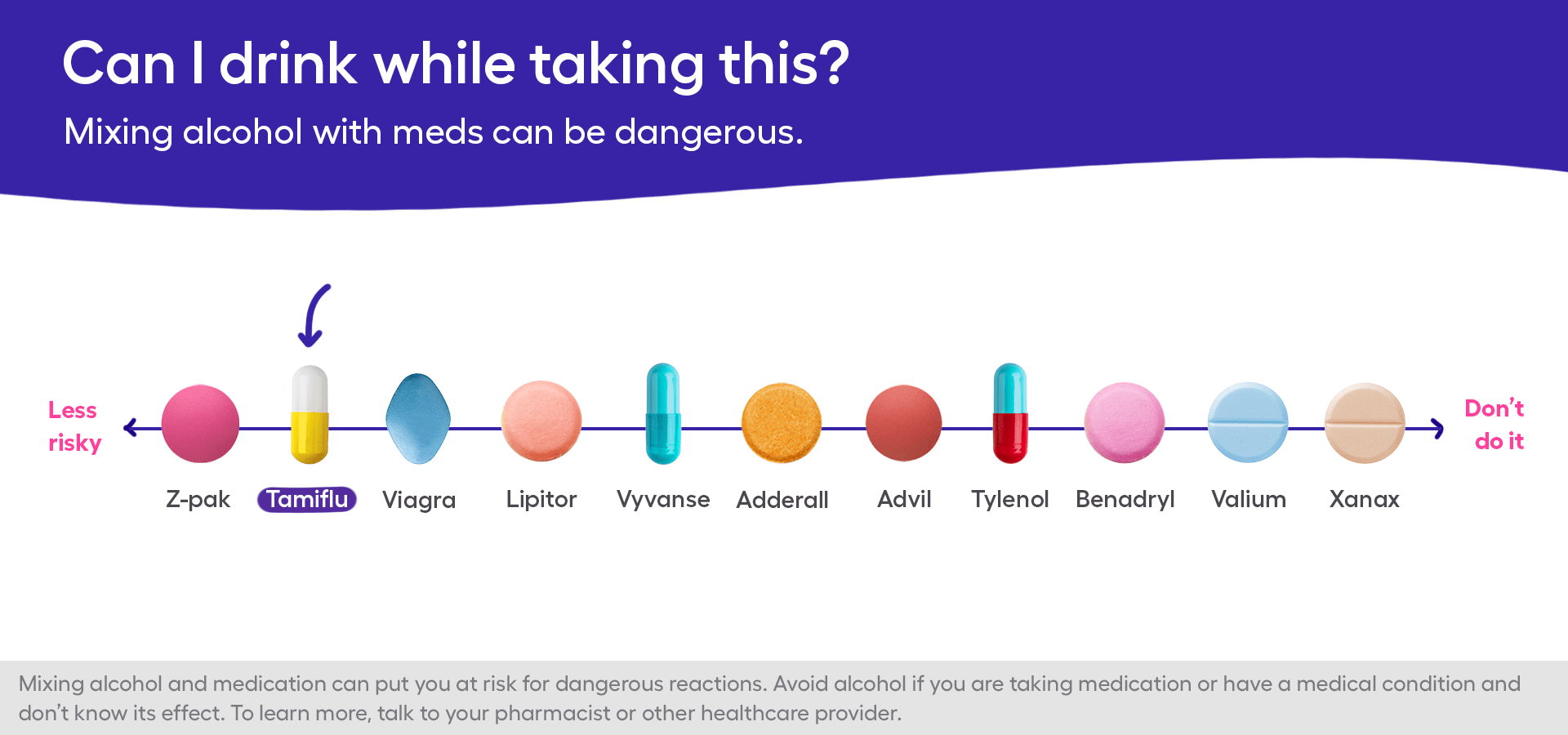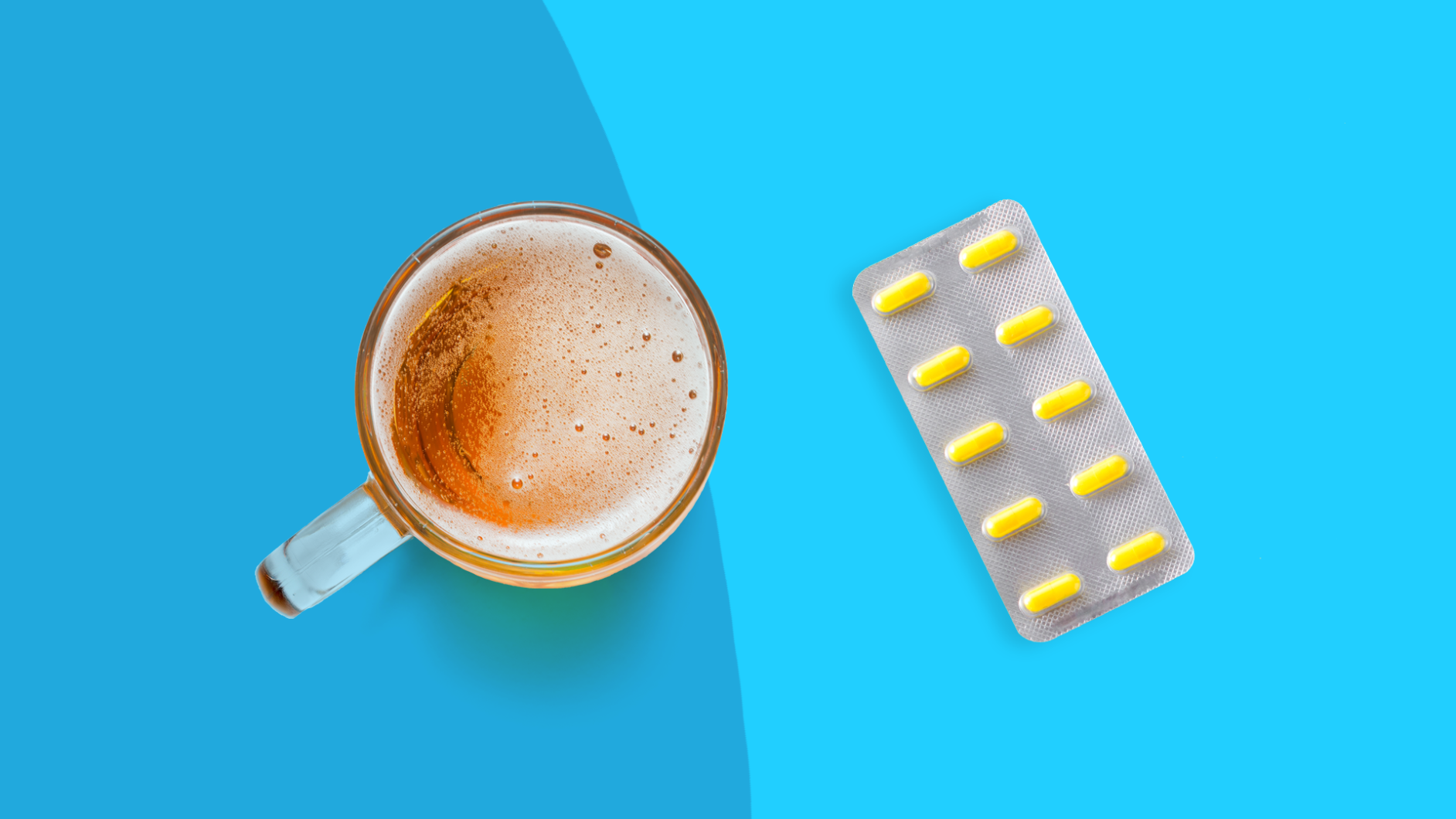Key takeaways
Mixing alcohol with cold and flu medication can exacerbate dehydration and worsen symptoms such as nausea, vomiting, and headaches.
Alcohol can impair the immune system, making it harder to recover from an illness, and can have dangerous interactions with over-the-counter cold and flu medications.
Certain medications, like cough suppressants and antihistamines, can have severe side effects when combined with alcohol, including increased dizziness, drowsiness, and risk of respiratory depression.
It’s advised to avoid alcohol when taking any kind of medication for colds, flu, pain relief, or sleep aids, as it can increase side effects and risk of liver damage or other serious health issues.
If you have the flu—or even just a severe cold—the last thing you probably feel like doing is going out for a night on the town. And while abstaining from alcohol is a good thing (and what your body needs when it is in virus-fighting mode), you may be tempted to try a hot toddy to soothe your sickness. Is that a good idea? Well, it all boils down to hydration (or lack thereof), experts say.
“One major reason people get hospitalized with severe viral infections is [because] they get severely dehydrated and weak,” Robert McLean, MD, president of the American College of Physicians, explains.
Alcohol only exacerbates this, he says, because it triggers a diuretic effect. Next thing you know, your body is expelling fluid (through urination) at a rapid rate. The hydration you need to get better? Gone (so much for all the tea, water, and chicken soup you’ve been downing). Not only that, but alcohol can actually make some of your symptoms, like nausea, vomiting, and headaches, worse. Why? Because alcohol produces some of the same side effects, says Kevin Davis, Pharm.D., pharmacy supervisor at the University of Florida Health, Jacksonville, and that adds insult to injury. What’s more, alcohol can impair the immune system, which isn’t what you need when you’re trying to recover from an illness.
And then there’s the matter of the over-the-counter meds you are taking to manage your symptoms. Flu or cold medicine combined with alcohol can actually have some very significant drug-drug interactions.
Cold and flu medicine and alcohol interactions
When it comes to cold medicines, there are lots of options. Depending on your symptoms, you may want to take one of the following:
- Cough suppressants, or antitussives, work by suppressing the urge to cough. The cough suppressant dextromethorphan OTC is common in brands like Delsym and Robitussin 12-Hour Cough Relief. Dextromethorphan can also be found in some combination prescription cough medications, such as promethazine/dextromethorphan cough syrup.
- Expectorants containing guaifenesin help to thin bronchial secretions, making it easier to cough out the mucus that builds up. Common brands include Mucinex and plain Robitussin.
- Combination cough medicines contain both expectorants and suppressants. A few combination brand names are Robitussin DM and Mucinex DM Fast-Max.
- Decongestants work to relieve nasal and sinus congestion and usually contain pseudoephedrine or phenylephrine. Brands include Sudafed Congestion and Sudafed PE. Nasal decongestant sprays, such as those made of oxymetazoline, help relieve sinus congestion and nasal stuffiness. Example brands include Vicks Sinex and Afrin. Nasal decongestant sprays should never be used for more than 3 days because they can cause rebound congestion, making symptoms worse.
- Antihistamines treat allergic symptoms like runny nose, sneezing, watery eyes, and itching. Brands include Benadryl, Claritin, Zyrtec, and Allegra.
Cough suppressants and alcohol
Before mixing a cough syrup with alcohol, it’s important to know about possible interactions. For example, dextromethorphan (DXM) is a central nervous system depressant like alcohol, so combining the two might be dangerous, increasing your risk of side effects like dizziness, drowsiness, impaired coordination, and difficulty concentrating.
Taking DXM with alcohol can also cause respiratory depression (slowed or stopped breathing), feelings of dissociation, brain lesions, epilepsy, or permanent psychosis. It’s best to avoid alcohol until the drug has left your body, about 24 to 48 hours after your last dose. But that’s not to say you should indulge in alcoholic drinks when sick–wait until you’re feeling better before imbibing. And despite popular myths, alcohol won’t do anything to suppress a cough.
According to the National Institute on Drug Abuse, DXM may be abused and taken in large quantities, called “robo-tripping” or “skittling.” When taken in large doses, the drug can cause a hallucinogenic effect like the illegal substances ketamine or PCP and is sometimes used by teens to get high.
RELATED: Can you drink while taking cough syrup?
NyQuil and alcohol
To make matters worse, many cold and flu treatment options are a combination of these medications. NyQuil, for example, contains the active ingredients acetaminophen, doxylamine, and dextromethorphan. (Some formulations of NyQuil also contain a nasal decongestant.) And most liquid formulations of Nyquil contain a small amount of alcohol.
Tylenol Severe Cold and Flu contains, in addition to acetaminophen, a cough suppressant (and several other ingredients). So when you combine these OTC remedies with alcohol, your risk of side effects increases a lot, says Dr. Davis. In addition to staying away from alcohol altogether while you are recovering from a cold or the flu, he urges patients to speak to the pharmacist about the best medications to actually use. The multiple ingredient over-the-counter medications are often unneeded with your specific symptoms—it is best to use single-ingredient products targeted to your exact symptoms. This helps limit side effects, too.
Codeine cough syrup and alcohol
In instances where a stronger cough preparation is needed, your treatment provider may prescribe a codeine-containing cough syrup, but these come with their own risks. In fact, narcotic medications like codeine have a high potential for abuse and dependence. Possible side effects from codeine include life-threatening breathing problems, sedation, and coma. The risk of these serious effects increases with alcohol, so never mix the two.
Natural cough suppressants and alcohol
Natural options like menthol rub or cough drops, ivy leaf extract, or a spoonful of honey, don’t have known interactions with alcohol, but it’s best not to drink when you’re ill to avoid alcohol’s immune-reducing effects.
Expectorants such as Robitussin—and alcohol
Plain Robitussin (without any letters after the name) contains the expectorant guaifenesin, which loosens secretions, making it easier to cough them up. Although guaifenesin does not have an interaction with alcohol, it’s best to skip alcohol while you are sick for the reasons mentioned above—alcohol can worsen symptoms and impair your immune system. It’s better to save the alcohol for when you are feeling better.
Decongestants and alcohol
Mixing decongestant-containing cold medicine and alcohol is not advisable. Drugs like Sudafed that contain pseudoephedrine, which is a stimulant, can mask feelings of intoxication, so it’s not a good idea to combine them with alcohol. If you’re planning to drink, nasal corticosteroids like Flonase or Nasonex won’t interact with alcohol, but stick to moderate intake.
Antihistamines and alcohol
If you’re taking an antihistamine, avoid alcohol. That’s because combining the two can intensify side effects like drowsiness, dizziness, and impaired coordination, leading to dangerous consequences. Although second-generation antihistamines like Allegra, Claritin, and Zyrtec have fewer side effects than their first-generation counterparts like Benadryl, it’s best to avoid alcohol when taking any of these medications.
Benadryl and alcohol
Benadryl (diphenhydramine) is an antihistamine that can relieve some of the upper respiratory symptoms that sometimes come with colds and flu. However, it also makes you drowsy. Alcohol, too, causes drowsiness. Take the two together, and you could wind up experiencing serious side effects —extreme drowsiness and impairment, slowed breathing, and possibly even unconsciousness.
RELATED: Is it safe to drink alcohol while taking allergy medicine?
Unisom and alcohol
Unisom (doxylamine succinate), also an antihistamine/sleep-aid, functions much like diphenhydramine, says Dr. Davis, so taking it with alcohol is a recipe for disaster.
Pain relievers and alcohol
It’s common to reach for an OTC or prescription medication for pain when you’re sick to soothe all those aches, but is it a good idea to combine them with alcohol? Whether you’re taking acetaminophen or an NSAID, it’s better not to drink with these drugs.
Tylenol and alcohol
Tylenol (acetaminophen) is a commonly used pain reliever and fever reducer that is metabolized by the liver, just like alcohol. Mixing the two under any circumstances is considered risky because, according to the Food and Drug Administration (and essentially all medical professionals), it has the potential to cause severe liver damage, or even death.
NSAIDs and alcohol
Avoid alcohol if you’re taking an NSAID of any kind (such as naproxen, ibuprofen, or aspirin). Research shows an increased risk of upper GI bleeding when the two are combined. And the National Kidney Foundation recommends avoiding alcohol when taking any pain relievers to avoid kidney damage, especially when taken in high doses or long-term.
RELATED: Is it safe to take over-the-counter painkillers with alcohol?
Tamiflu and alcohol
Somewhat ironically, antiviral medications used to treat the flu do not have direct drug-drug interactions with alcohol, says Dr. Davis. Tamiflu and Xofluza both have some drug-drug interactions, but they both do not interact with alcohol.

RELATED: Tamiflu vs. Xofluza—which works better?
So does this mean it is okay to have a little whiskey while you fight the fever and severe aches and pains brought on by this punishing virus? No, for all the reasons listed above.
“It is definitely not a good idea when you are sick at all to drink alcohol,” Dr. Davis says. If you’re struggling with alcohol abuse, reach out to your healthcare provider for information on how to quit.
Plus, Tamiflu and Xofluza need to be started within 24-48 hours of symptoms onset—when you likely feel extremely miserable. Chances are you won’t be getting up off the couch, let alone heading to the fridge to grab a beer (and of course we recommend avoiding getting the flu altogether by getting a flu shot—it is not too late!).



